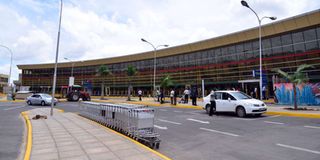Covid-19: Hope for Kenyans stuck in India as travel allowed

Jomo Kenyatta International Airport's Terminal 1-A.
What you need to know:
- This comes after intense weeklong negotiations between Kenya’s Mission in New Delhi and the Ministry of Health.
Kenya has resolved to allow students, patients and their caregivers who are stuck in India to return to the country.
This comes after intense weeklong negotiations between Kenya’s Mission in New Delhi and the Ministry of Health.
In an interview with the Nation on Monday, High Commissioner to India Willy Bett said they were receiving the details of citizens who wish to return to the country.
“We have issued two memos. We are asking patients, their caregivers and students who have finished their studies and intend to go home to send their booking reference numbers to us, after they secure their tickets, so that we provide special permission for them to be allowed into the country,” he said.
However, a high-ranking official at the embassy, who has been asked to deal with Kenyans intending to fly home, said that although allowed to travel, no flight from Kenya will pick them up.
“We are asking them to look for airlines such as Qatar, Ethiopian and Emirates then send us their booking reference numbers because the Kenyan government is still not allowing flights to and from India but that does not imply a ban,” said the official who did not want to be named.
“Our air bubble agreement is intact but due to the pandemic, a new advisory was put in place.”
Conditions
In the first memo dated May 31 and signed by Mr Bett, the mission notes that passenger flights from India to Kenya were suspended as a result of the Covid-19 crisis there. He says, however, that there is now a way forward.
“The Kenya High Commission, New Delhi, has had engagements with various government ministries and departments to work on modalities to ensure Kenyans stranded in India return home. The Ministry of Health has issued a no-objection certificate for Kenyans stranded in India to be able to go home,” he says.
The memo, reference number KHC/ND/35 vol II, gives conditions including having a certificate indicating one is Covid-19-negative, taken 96 hours before departure, and a requirement to undergo an antigen rapid diagnostic test at the airport.
Passengers who turn negative will undergo 14 days of monitored quarantining at home and register on the Jitenge system. Those who turn positive will give second samples for PCR-based tests and will be placed in isolation.
Those who wish to travel were asked to send their itinerary to email address [email protected] or phone number +919873111197 to allow them to inform Nairobi appropriately.
Scholarship students
The second memo says some Kenyan students stuck in India are allowed to return home.
“The government has granted approval to Kenyan students in India under the Indian Council for Cultural Relations (ICCR) Scholarship Programme, who have completed or are about to complete their final exams to travel back to Kenya,” it says.
They must have Covid-19-negative certificates for tests taken at least 96 hours before departure and will have an antigen rapid diagnostic test taken at the airport
Those who test negative will be placed on a 14-day quarantine while those found positive will be placed in a government isolation facility at their own costs.
Last year in a quid-pro-quo understanding, India approved Kenya’s official request granting special permission that saw Kenyan and Indian national carriers fly passengers to and from the countries, despite lockdowns, until a more lethal Covid-19 variant was confirmed in India.
"In order to further boost international air connectivity, air bubble arrangements are now in place with Kenya and Bhutan,” India’s Civil Aviation Minister Hardeep Singh Puri then said in an official tweet.
“Indian carriers will be able to operate to these countries. Carriers of these countries will be able to fly to India.”
On Monday, India recorded 152,734 new Covid-19 cases out of 1,683,135 samples, as per data from the Indian Council of Medical Research.





